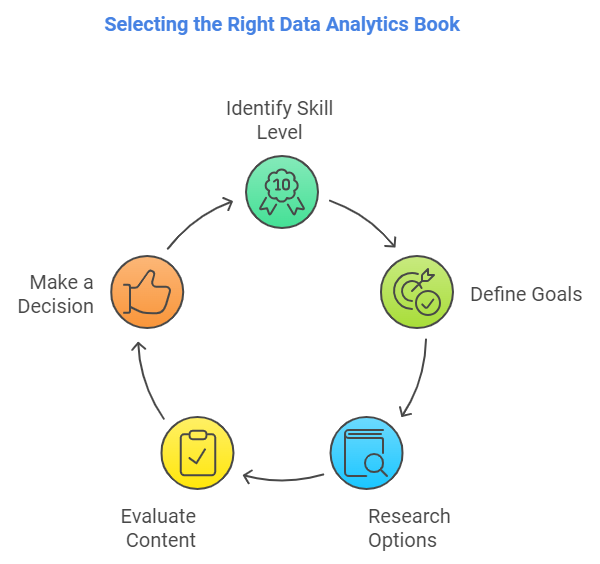The ability to extract actionable insights from data is no longer a niche skill—it’s a business imperative. Companies are drowning in data, and those who can make sense of it drive the future. Whether you’re a beginner trying to break into the world of data or a seasoned professional looking to sharpen your skills, choosing the right resources can make all the difference. One of the best ways to do that? By diving deep into some of the top data analytics books available today.
If you’re reading this, you already know that data analytics isn’t just about crunching numbers. It’s about telling a story with data, making informed decisions, and driving real impact. But how do you get there? Let’s skip the fluff and jump straight into a curated list of data analytics books that will help you master this ever-evolving field.
Why Books Matter in Your Data Analytics Journey
Before we jump into the list, it’s important to understand why data analytics books remain one of the most valuable tools in a data professional’s toolkit. While online courses, boot camps, and tutorials are popular for their accessibility and interactivity, books provide a deeper level of knowledge. They allow authors to dive into complex topics in ways that short-form content can’t.
Books also offer the benefit of being written by experts who have spent years mastering their craft. Many of these authors are seasoned professionals in data science and analytics, bringing decades of experience to the table.
Now, let’s explore the data analytics books you absolutely need on your shelf.
1. Data Science for Business: What You Need to Know About Data Mining and Data-Analytic Thinking
By Foster Provost and Tom Fawcett

This is one of the foundational data analytics books for anyone serious about understanding the mechanics of data-driven decision-making. Provost and Fawcett present key concepts in data science in a way that’s digestible for non-technical readers without compromising on depth. You’ll learn not just how to run analyses but also how to think analytically about data, which is arguably more important.
Key Takeaways
- Understand how data science fits into the business decision-making process.
- Learn key techniques like decision trees, clustering, and regression analysis.
- Explore real-world business case studies where data analytics made a measurable impact.
2. Naked Statistics: Stripping the Dread from the Data
By Charles Wheelan

Statistics can be intimidating, but Wheelan breaks down complex statistical concepts in a way that’s both entertaining and educational. If you’ve ever been scared off by numbers or technical jargon, this book will demystify data analytics for you. It’s light on the math and heavy on practical applications, making it one of the most approachable data analytics books out there.
Key Takeaways
- Grasp core statistical concepts without needing a PhD in mathematics.
- Learn how to interpret data accurately and avoid common pitfalls.
- Explore how statistics is used in real-world scenarios like sports, politics, and business.

3. Data Analytics Made Accessible
By Anil Maheshwari

Maheshwari’s guide is one of the most comprehensive data analytics books for beginners, covering everything from basic concepts to advanced techniques. What makes this book stand out is its blend of theory and practical examples, ensuring that readers not only understand the “what” but also the “how” of data analytics.
Key Takeaways
- Learn the entire data analytics lifecycle, from data collection to visualization.
- Understand key tools used in the field, like Python and R.
- Dive into case studies that show the impact of data analytics in different industries.
4. Storytelling with Data: A Data Visualization Guide for Business Professionals
By Cole Nussbaumer Knaflic

Numbers on a spreadsheet are meaningless unless you know how to present them effectively. This book emphasizes one of the most critical aspects of data analytics: communication. Knaflic shows how to transform data into a compelling story through visualization, making it one of the must-read data analytics books for professionals who need to present data to stakeholders.
Key Takeaways
- Learn best practices for creating clean, impactful data visualizations.
- Understand the psychology behind how people interpret data visuals.
- Explore real-world examples of effective data storytelling in business contexts.
5. Python for Data Analysis: Data Wrangling with Pandas, NumPy, and IPython
By Wes McKinney

If you’re ready to move beyond theory and into hands-on work, McKinney’s book is an essential guide to mastering Python for data analytics. Python has become the go-to language for data professionals, and this book will show you why. It’s packed with practical tutorials on using libraries like Pandas and NumPy, which are fundamental for data manipulation and analysis.
Key Takeaways
- Learn how to use Python to manipulate, clean, and analyze data sets.
- Master essential libraries like Pandas, NumPy, and IPython.
- Explore practical examples that show how to apply Python in real-world data projects.
Also Read: Best 14 Digital Marketing Books you need to read this year
6. The Signal and the Noise: Why So Many Predictions Fail—but Some Don’t
By Nate Silver

Nate Silver, founder of FiveThirtyEight, is famous for his accurate predictions in politics, sports, and economics. In this book, he discusses how to distinguish valuable insights from the noise in the data. If you’ve ever wondered why some models succeed while others fail, this book will give you a deep understanding of prediction in data analytics.
Key Takeaways
- Learn how to build predictive models that avoid common errors.
- Understand the difference between signal (useful information) and noise (random data).
- Explore real-world examples of data predictions in different fields.
7. Too Big to Ignore: The Business Case for Big Data
By Phil Simon

In a world overflowing with data, understanding how to harness its power is crucial. Simon’s Too Big to Ignore explains why big data is more than just a buzzword—it’s a game-changer for businesses. This book makes a compelling case for why organizations must embrace data analytics and leverage it to drive competitive advantage. Through real-world case studies and actionable strategies, Simon shows how companies are using big data to make better decisions and enhance their operations.
Key Takeaways
- Learn why big data is crucial for modern business decision-making.
- Case studies that illustrate the tangible benefits of big data.
- Practical advice on how to use data effectively to improve performance.
- Written in an accessible and engaging manner, making complex concepts easy to grasp.
8. Lean Analytics: Use Data to Build a Better Startup Faster
By Alistair Croll and Benjamin Yoskovitz

For entrepreneurs and startup enthusiasts, this book focuses on how analytics can drive growth and success. Croll and Yoskovitz provide practical frameworks and actionable insights that show how to measure startup performance effectively. They emphasize the importance of key metrics that matter for startups, making it one of the best data analytics books for those in the early stages of business development.
Key Takeaways
- Practical Frameworks: Frameworks for measuring startup performance.
- Real-World Examples: Case studies that illustrate how analytics can inform business decisions.
- Actionable Insights: Practical tips for using data effectively.
- Emphasis on Metrics: Discussion of key metrics that matter for startups.
9. SQL for Data Analysis
By Cathy Tanimura

Understanding SQL is essential for any data analyst, and Tanimura’s book is a hands-on guide to mastering it specifically for data analysis. It focuses on the skills needed to derive insights from databases, making it an essential resource for both beginners and seasoned data professionals looking to refine their SQL skills.
Key Takeaways
- Practical SQL queries and examples to practice.
- Learn how to clean and analyze data using SQL.
- Uses case studies to illustrate SQL applications.
- Accessible for those new to SQL, making it a great starting point.
10. Practical Statistics for Data Scientists: 50 Essential Concepts
By Peter Bruce and Andrew Bruce

This book serves as a bridge between theory and practice, focusing on essential statistical concepts for data science. It’s particularly useful for data analysts and data scientists who need to apply statistics in their work. The authors break down 50 key concepts that every data professional should know.
Key Takeaways
- Grasp statistical techniques that are directly applicable to data science.
- Learn how to apply these techniques in real-world scenarios using R and Python.
- Explore common pitfalls in statistical analysis and how to avoid them.
Also Read: Understanding the Scope of Marketing Research
How to Select the Best Book for You
Each of these data analytics books offers something unique: hands-on tutorials, strategic insights, or foundational knowledge. The right book for you will depend on where you are in your data analytics journey. Beginners might want to start with “Naked Statistics” or “Data Science for Business,” while more advanced professionals could dive into “Python for Data Analysis” or “SQL for Data Analysis.”
Here are some tips to help you select the best book for your needs and goals:

- Identify Your Skill Level
Assess your current knowledge of data analytics. Are you a beginner looking for foundational concepts, or are you more experienced and seeking advanced techniques? Choosing a book that matches your skill level will ensure you get the most out of your reading experience.
- Define Your Learning Goals
Determine what you want to achieve by reading a particular book. Are you looking to master a specific tool, like Python or SQL? Or are you more interested in understanding how data analytics impacts business decision-making? Having clear goals will help narrow your options.
- Consider Your Learning Style
Different books cater to different learning styles. If you prefer hands-on learning, look for books with practical exercises and real-world examples. If you enjoy theoretical insights, choose books that delve deep into concepts and frameworks.
- Check the Author’s Credentials
Research the author’s background and expertise in the field of data analytics. Authors with extensive experience and a strong reputation in the industry are more likely to provide valuable insights and practical advice.
- Read Reviews and Recommendations
Take advantage of online reviews and recommendations from trusted sources. Websites like Goodreads or Amazon can provide insights from other readers about the book’s effectiveness and content quality. Additionally, look for suggestions from industry professionals or communities.
- Sample the Content
Many online retailers offer previews of books. Take advantage of these samples to gauge whether the writing style and content resonate with you. If the book captures your interest in the first few pages, it’s likely a good fit.
- Consider the Scope and Depth
Some books provide an overview of a wide range of topics, while others focus deeply on a specific subject. Depending on your needs, you may prefer a book that covers many areas or one that dives deeply into a single topic.
- Evaluate Your Resources
Consider whether you have access to the tools or software discussed in the book. If a book heavily emphasizes using specific tools (like Python or R), ensure you have the necessary resources to practice what you learn.
By taking these factors into account, you can confidently select a data analytics book that aligns with your goals, learning style, and existing knowledge. This thoughtful approach will help you make the most of your reading experience and ultimately enhance your data analytics skills.
Also Read: Scope of Marketing
Also Read: Scope of Marketing Analytics
Conclusion
The field of data analytics is constantly evolving, but the fundamentals remain the same: extracting insights from data to drive decisions. These data analytics books provide a roadmap for mastering both the technical and strategic aspects of the field. Whether you’re looking to break into data analytics or level up your existing skills, the knowledge contained in these books will set you on the path to success.

